#Antoine e Colette
Text
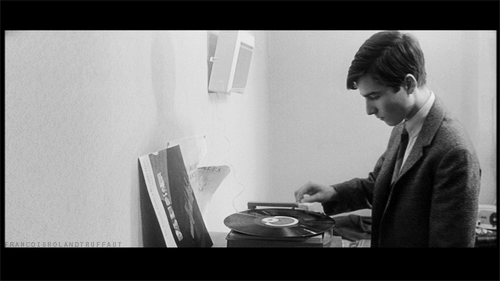

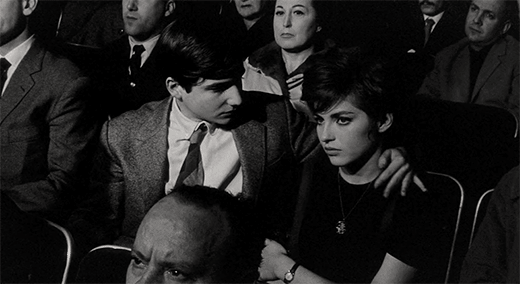

L'amore a vent'anni (1962) François Truffaut
vimeo
@pigscreen
#l'amore a ventanni#antoine e colette#françois truffaut#video#streaming#short film#vimeo#completemovie#pigscreen#Vimeo
31 notes
·
View notes
Text

117. Antoine e Colette (Antoine et Colette, 1962), dir. François Truffaut
2 notes
·
View notes
Text
The Antoine Doinel Cycle
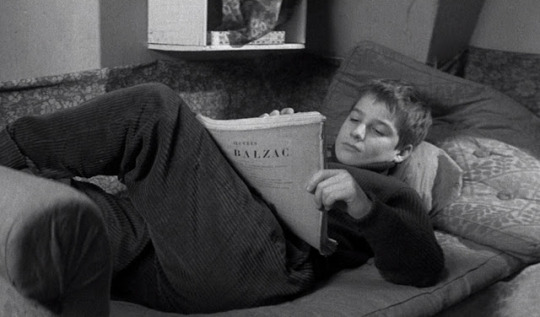
Jean-Pierre Léaud in The 400 Blows (François Truffaut, 1959)
Cast: Jean-Pierre Léaud, Albert Rémy, Claire Maurier, Patrick Auffay, Georges Flamant. Screenplay: François Truffaut, Marcel Moussy. Cinematography: Henri Decaë. Film editing: Marie-Josèphe Yoyotte. Music: Jean Constantin.
One of the unquestioned great movies, and one of the greatest feature-film directing debuts, The 400 Blows would still resonate with film-lovers even if François Truffaut hadn't gone on to create four sequels tracking the life and loves of his protagonist, Antoine Doinel (Jean-Pierre Léaud). There are, in fact, those who think that the last we should have seen of Antoine was the haunting freeze-frame at the end of the film. But Antoine continued to grow up on screen, and perhaps more remarkably, so did Léaud, carving out his own career after his debut as a 13-year-old. (It's hard to think of any American child actors who were able to maintain a film career into adulthood as well as Léaud did. Mickey Rooney? Dean Stockwell? Who else?) Having Truffaut as a mentor certainly helped, but Léaud had an unmistakable gift. He is on screen for virtually all of the 99-minute run time, and provides a gallery of memorable moments: Antoine in the amusement-park centrifuge, Antoine in the police lockup, Antoine on the run -- in cinematographer Henri Decaë's brilliant long tracking shot. And my personal favorite moment: when the psychologist asks Antoine if he's ever had sex. Léaud responds with a beautiful mixture of surprise, amusement, and embarrassment. It's so genuine a response that I have to think it was improvised, that Truffaut surprised Léaud with the question. But even so, Léaud never drops character in his response. This praise of Léaud is not to undervalue the magnificent supporting cast, or the haunting score by Jean Constantin. It's a film in which everything works.
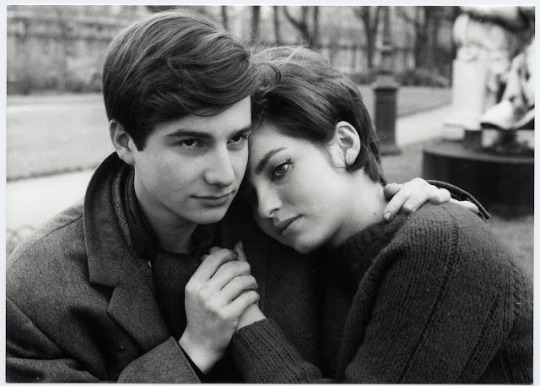
Jean-Pierre Léaud and Marie-France Pisier in Antoine and Colette (François Truffaut, 1962)
Cast: Jean-Pierre Léaud, Marie-France Pisier, Rosy Varte, François Darbon, Patrick Auffay, Jean-François Adam. Screenplay: François Truffaut. Cinematography: Raul Coutard. Music: Georges Delerue.
Four years after he made The 400 Blows, Truffaut was asked to contribute to an anthology of short films by directors from various countries to be called Love at Twenty. As he had with the first film, Truffaut drew on his own experience, an infatuation with a girl he had met at the Cinémathèque Française. And since Léaud was available -- he had worked with Julien Duvivier on Boulevard (1960) after completing The 400 Blows -- it made sense for him to play Antoine Doinel again. A narrator tells us that Antoine had been sent to another reform school after escaping from the first, and that this time he had responded well to a psychologist: After leaving school, he has found a job working for the Phillips record company and is living on his own. Then he sees a pretty young woman at a concert of music by Berlioz and falls for her. Colette (Marie-France Pisier) is not much interested in him, but she is evidently flattered by his advances. Her parents like Antoine and encourage him so much that he rents a room across the street from them. (Truffaut had done the same thing during his crush.) But one evening when he comes to dinner at their apartment, a man named Albert (Jean-François Adam) calls on Colette and she leaves Antoine watching TV with her parents. It's a droll little film, scarcely more than an anecdote, and the stable, lovestruck Antoine doesn't seem much like either the rebellious Antoine of the first film or the more scattered Antoine of the later ones in the cycle.
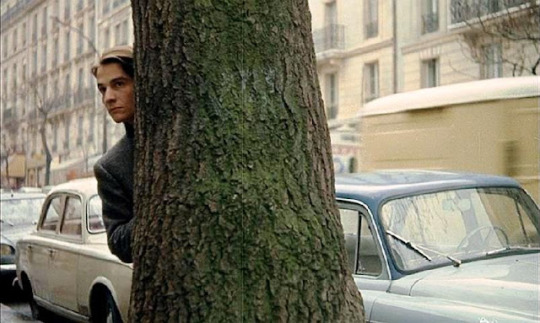
Jean-Pierre Léaud in Stolen Kisses (François Truffaut, 1968)
Cast: Jean-Pierre Léaud, Claude Jade, Michael Lonsdale, Delphine Seyrig, Michael Lonsdale, Claire Duhamel, Daniel Ceccaldi. Screenplay: François Truffaut, Claude de Givray, Bernard Revon. Cinematography: Denys Clerval. Production design: Claude Pignot. Film editing: Agnès Guillemot. Music: Antoine Duhamel.
The Antoine of Stolen Kisses is in his 20s, but has reverted to the more haphazard ways of his adolescence: He has been kicked out of the army, and now relies on a series of odd jobs to get by. But he has also renewed acquaintance with a young woman he met before going into the army, Christine Darbon (Claude Jade). Like Colette's parents, hers are quite taken with Antoine, and they help him get a job as a night clerk in a hotel. He gets fired from that job after helping a private detective who is spying on an adulterous couple, but the detective helps Antoine get a job with his agency. While working for the detective agency, he has to pose as a clerk in a shoe store, and winds up in a liaison with the store owner's wife, Fabienne (Delphine Seyrig). When that ends badly, he becomes a TV repairman, which brings him back to Christine, with whom he winds up in bed after trying to fix her TV. At the film's end, a strange man who has been following Christine comes up to her and Antoine in the park and declares his love for her. She says he must be crazy, and Antoine, who perhaps recognizes his earlier infatuation with Colette in the man's obsession, murmurs, "He must be." Stolen Kisses is the loosest, funniest entry in the cycle, though it was made at a time when Truffaut was politically preoccupied: The film opens with a shot of the shuttered gates of the Cinémathèque Française, which was shut down in a conflict between its director, Henri Langlois, and culture minister André Malraux. This caused an uproar involving many of the directors of the French New Wave. Some of Antoine's anarchic approach to life may have been inspired by the rebelliousness toward the establishment prevalent in the film community. But it's clear that the idea of a cycle of Antoine Doinel films has been brewing in Truffaut's mind: There is a cameo appearance by Marie-France Pisier as Colette and Jean-François Adam as Albert, now married and the parents of an infant.

Claude Jade and Jean-Pierre Léaud in Bed and Board (François Truffaut, 1970)
Cast: Jean-Pierre Léaud, Claude Jade, Claire Duhamel, Daniel Ceccaldi, Hiroko Berghauer. : François Truffaut, Claude de Givray, Bernard Revon. Cinematography: Néstor Almendros. Production design: Jean Mandaroux. Film editing: Agnès Guillemot. Music: Antoine Duhamel.
Antoine and Christine have married, and they have settled down in a small apartment. (There's some indication that it's paid for by her parents.) She gives violin lessons and he sells flowers -- carnations, which he dyes, using some environmentally questionable potions. But settling down isn't in Antoine's nature, and when Christine gets pregnant he looks for more lucrative work. He finds a curious sinecure in a company run by an American: Antoine maneuvers model ships by remote control through a mockup of a harbor. ("It gives me time to think," he says.) One day, a Japanese businessman comes to see the demonstration, accompanied by a pretty translator named Kyoko (Hiroko Berghauer), and Antoine is soon involved in an affair with her. Naturally, this precipitates a breakup, though by film's end they have seemingly reconciled. Still, it's obvious that the marriage is not destined to be permanent. They can't even agree on a name for their son: She wants him to be called Ghislain, and he wants to call him Alphonse. Antoine wins out by a trick: He's the one who goes to the registry office to legalize the boy's name. Antoine also spends time writing a novel about his boyhood, to which Christine objects: "I don't like this business of writing about your childhood, dragging your parents through the mud. I don't know much but I do know one thing: If you use art to settle accounts, it's no longer art." Truffaut had his own regrets about the portrait of his parents in The 400 Blows. Less farcical than Stolen Kisses, Bed and Board still has a strong vein of comedy tinged with melancholy.
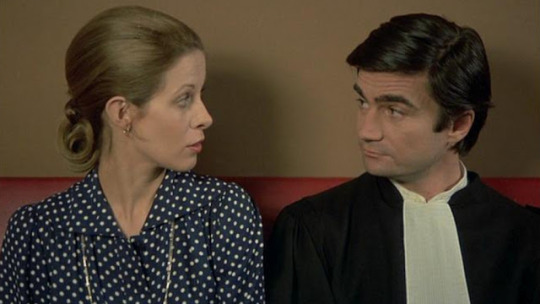
Claude Jade and Jean-Pierre Léaud in Love on the Run (François Truffaut, 1979)
Cast: Jean-Pierre Léaud, Marie-France Pisier, Claude Jade, Dani, Dorothée, Daniel Mesguich, Julien Bertheau. Screenplay: François Truffaut, Marie-France Pisier, Jean Aurel, Suzanne Schiffman. Cinematography: Néstor Almendros. Production design: Jean-Pierre Kohut-Svelko. Film editing: Martine Barraqué. Music: Georges Delerue.
Truffaut admitted that he wasn't happy with the final film in the cycle. It's a bit too heavily reliant on flashback clips from the four earlier films, and if it's intended to show that Antoine has finally stabilized now that he's in his 30s and divorced from Christine, it doesn't quite make the case. He has a new girlfriend, Sabine (Dorothée), his novel has been published several years earlier, and he works as a proofreader for a printing house. He's on friendly terms with Christine, and agrees to take their son, Alphonse, to the train station when the boy leaves for a summer music camp. At the station, he runs into Colette, now a defense lawyer, who is on her way to confer with a client -- a man who has murdered his 3-year-old boy. Perhaps a little too coincidentally, Colette is involved with Sabine's brother, Xavier (Daniel Mesguich), and she has bought a copy of Antoine's novel to read on the train. Antoine impulsively boards the train, and sets up a meeting with Colette in the dining car, after which she invites him back to her compartment. All of this sets up a series of revelations: Colette's marriage to Albert broke up after their small daughter was killed by a car. She claims that she supplements her small income as a lawyer by prostituting herself with men she meets on trains. Antoine finally made peace with his mother after her death when he met her old lover, M. Lucien (Julien Bertheau), who persuaded him to visit his mother's grave. (There is a flashback to the scene in The 400 Blows when Antoine, playing hooky, sees his mother kissing a strange man on the street.) Antoine became infatuated with Sabine after hearing a man in a phone booth arguing with a woman on the other end of the line and then tearing up her photograph. Antoine picked up the pieces from the floor, put them together, and after some sleuthing, discovered the woman was Sabine. His marriage to Christine finally broke up after he slept with her friend Liliane (Dani), who he previously had thought was having a lesbian relationship with Christine. And so on. The result of all the flashbacks and revelations is not to round out the Antoine Doinel saga, but to make Love on the Run feel over-contrived.
#The 400 Blows#Jean-Pierre Léaud#Marie-France Pisier#François Truffaut#Antoine and Colette#Stolen Kisses#Bed and Board#Claude Jade#Love on the Run
15 notes
·
View notes
Note
For the ask game with the songs: can you give us Mathias, Dottie, Antoine, Colette and Lucia?
Hi there, Nonnie :)
Welcome welcome, and thank you for sending this ask! :) Allow me to answer it! (also, I already answered Antoine and Colette here, but I don't mind giving you another answer for them, because I have more than one songs for them <3 :D)
-----------------------------------------------------------------------------------------
MATHIAS DE BEAUMONT
"Though we share this humble path, alone
How fragile is the heart
Oh give these clay feet wings to fly
To touch the face of the stars
Breathe life into this feeble heart
Lift this mortal veil of fear
Take these crumbled hopes, etched with tears
We'll rise above these earthly cares
Cast your eyes on the ocean
Cast your soul to the sea
When the dark night seems endless
Please remember me"

----------------------------------------------------------------------------------------
DOROTHEA STARRICK
"Deep in the winter
Amidst falling snow
High in the air
Where the bells they all toll
And now all around me
I feel you still here
Such is the journey
No mystery to fear
Here is my heart and I give it to you
Take me with you across this land
These are my dreams, so simple so few
Dreams we hold in the palm of our hands
The road now leads onward
I know not where
I feel in my heart
That you will be there
Whenever a storm comes
Whatever our fears
The journey goes on
As your love ever nears"

--------------------------------------------------------------------------------------------
ANTOINE DE BEAUMONT
"E quel mio cuore d'inverno
È un fiore di primavera
Che brucia dentro l'inferno
Come se fosse di cera
Sei tu che soffi sul fuoco
Tu, bella bocca straniera
Ti spio, ti voglio, ti invoco
Io sono niente e tu vera
Mi distruggerai
Mi distruggerai
E ti maledirò finché avrò vita e fiato
Mi distruggerai
Mi distruggerai
Tu mi hai gettato nell'abisso
Di un pensiero fisso
Tu mi distruggerai
Mi distruggerai
Mi distruggerai"
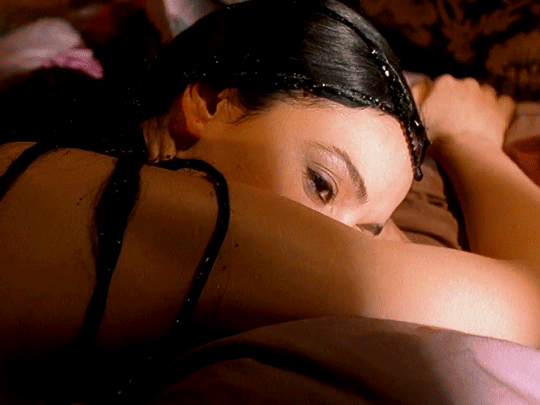
--------------------------------------------------------------------------------------------
COLETTE DE BEAUMONT
Alegria
I see a spark of life shining
Alegria
I hear a young minstrel sing
Alegria
Beautiful roaring scream
Of joy and sorrow, so extreme
There is a love in me raging
Alegria
A joyous, magical feeling
Alegria
Come un lampo di vita
Alegria
Come un pazzo gridar
Alegria
Del delittuoso grido
Bella ruggente pena, seren
Come la rabbia di amar
Alegria
Come un assalto di gioia
Del delittuoso grido
Bella ruggente pena, seren
Come la rabbia di amar
Alegria
Come un assalto di gioia
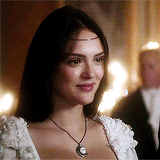
--------------------------------------------------------------------------------------------
LUCIA BARBARIGO
The valley green was so serene
In the middle ran a stream so blue
A maiden fair, in despair, once had met her true love there and she told him
She would say
"Promise me , when you see, a white rose you'll think of me
I love you so
Never let go
I will be your ghost of a rose"
Her eyes believed in mysteries
She would lay amongst the leaves of amber
Her spirit wild, heart of a child, yet gentle still and quiet and mild and he loved her
When she would say
"Promise me , when you see, a white rose you'll think of me
I love you so
Never let go
I will be your ghost of a rose"

thank you, Nonnie <3
For giving me the chance to talk about them <3
#replies#Nonnie#Mathias De Beaumont#Dorothea Starrick#Antoine De Beaumont#Colette De Beaumont#Lucia Barbarigo#my ocs
2 notes
·
View notes
Text
racha de pelis 2022
1- spiderman: far from home
2- Spiderman: no way home
3- Antoine et colette
4- Junior (corto)
5- last night in soho
6- shes funny that way
7- encanto
8- rifkin’s festival
9- la voz humana
10- licorice pizza
11- no mataras
12- el callejón de las almas perdidas
13- licorice pizza
14- la celebración
15- sex lies and videotape
16- madres paralelas
17- the house
18- licorice pizza
19- belfast
20- the killing of a sacred deer
21- los sonámbulos
22- una larga noche para francisco sanctis
23- el lado oscuro del corazón
24- el prófugo
25- pulp fiction
26- sex mission
27- battle royale
28- la iluminacion
29- santa sangre
30- hombre mirando al sudeste
31- el padrino
32- lolita (1962)
33- lolita (1997)
34- ensayo general
35- the northman
36- quien ama a brecht?
37- hipocresía
38- la cifra impar
39- dos años después (los espigadores 2)
40- el lobo de wall street
41- el ultimo metro
42- masculino femenino
43- los ojos sin rostro
44- masculino femenino
45- blade runner
46- licorice pizza
47- la edad media
48- zama
49- los paranoicos
50- el exorcista
51- trenque lauquen
52- hace mucho que no duermo
53- le pupille (c)
54- el sembrador de estrellas (c)
55- camarera de piso (c)
56- veo como de colores (c)
57- juana banana
58- duro de matar
59- videodrome
60- mekas x lennon (m)
61- mekas x warhol (c)
62- mekas x hill (m)
63- el último hereje
64- a woman under the influence
65- lobo e cao
66- taxi driver
67- juana banana
68- high fidelity
69- white noise
70- beyond the valley of the dolls
71- annie hall
0 notes
Text
L'Enfant sauvage (François Truffaut, 1969)
La carrera de ese cineasta tímido y subjetivista que es Truffaut ha seguido por ahora un movimiento pendular que hace —hablando esquemáticamente— que sus películas oscilen entre dos polos: lo concreto real y lo ideal imaginario, predominando el primer extremo en Les Quatre Cents Coups, Antoine et Colette, La Peau douce, Baisers volés y Domicile conjugal, y el segundo en Tirez sur le pianiste, Jules et Jim, Fahrenheit 451, La Mariée était en noir y La Sirène du Mississipi, si bien a partir de 1967 esta escisión se relativiza, al liberarse Truffaut de su obsesión por lo verosímil —que a veces antepuso a lo verdadero—, presagiándose ya en Besos robados una confluencia de ambas vertientes, que tiene lugar en L'Enfant sauvage, su obra más madura y objetiva.
En L'Enfant sauvage, Truffaut amplía su radio de visión, y eleva su punto de mira: los acontecimientos ya no se le escapan (en su fugacidad instantánea), ni le sobrepasan; Truffaut asiste a lo que muestra, pero no pasivamente, puesto que, al encarnar él mismo a Itard, le representa y actúa con él; por primera vez, Truffaut dirige no tras la cámara —desde fuera de la acción—, sino desde dentro del encuadre, y su perspectiva es, por tanto, otra: más completa. Como, además, nos permite asistir al drama, asiste con nosotros, de forma que, frente a sus demás películas, L'Enfant sauvage se define por su globalidad, por la captación simultánea desde tres puntos de vista de unos mismos hechos.
El tema sólo le es cercano por paralelismo, como metáfora de su propia biografía, y además se sitúa en una época distante (hacia 1805), que no ha vivido ni conoce por referencias directas (como era el caso en Jules et Jim, situada en la segunda década del siglo XX); de ahí que Truffaut pierda la proximidad que caracteriza a sus cuatro films sobre Antoine Doinel, y se distancie lo suficiente como para que L'Enfant sauvage, como film sobre la cultura y el aprendizaje, se acerque a la más teórica de sus películas, la subvalorada Fahrenheit 451, que, curiosamente, es el otro margen histórico de su obra (finales de este siglo). El choque entre el método de rodaje —especialmente interior al film— y la actitud de Truffaut con respecto a lo que narra —una objetividad comprometida— hace de L'Enfant sauvage la fusión de las dos caras —cóncava la una, convexa la otra— que posee, casi siempre por separado, su cine, y que encierran ahora entre sus superficies todo lo que es el film, captación global y compleja de un problema y no —como antes— exploración parcial, hacia dentro o hacia fuera, de un sector de la realidad: Truffaut no se proyecta hacia el pasado (evocación doineliana), ni hacia su entorno (La piel suave), ni desde su imaginación (La novia vestía de negro, La sirena del Mississipi), sino que actúa y se contempla actuando dentro de su entorno.
La extremada claridad que caracteriza este film es la forma elegida por Truffaut para expresar el último —y también el más primario— significado de L'Enfant sauvage: el acceso a la inteligibilidad. La película es una crónica (en presente) del trabajo realizado por el doctor Jean Itard para convertir a un niño (sombra en potencia, proyecto de hombre) salvaje (ajeno por completo a la comunicación, a la civilización, a la sociedad, a la cultura y al lenguaje), es decir, casi a un animal, en un ser inteligente e inteligible —y no sólo vivo—, que piensa, que convive y que tiende a comunicarse (a integrarse en una sociedad, a devenir ser social). La tarea de Itard consiste, pues, en ayudarle a cruzar la frontera que separa lo animal de lo humano, y su dificultad es tal que, junto a la responsabilidad con que Itard se entrega a su trabajo, confiere a la película una dimensión moral —muy explícita— que la aleja de otras de corte similar —como la excelente The Miracle Worker, de Penn—, más cercanas a la doma y al amaestramiento que a la enseñanza. En algún sentido, el film de Truffaut quiere inscribirse, por su inteligibilidad y por la postura de Itard —perfectamente típica de la Francia postrevolucionaria—, en el seno de una cierta tradición racionalista, que confiere al film su condición de obra didáctica (en el sentido rosselliniano del término: véanse La Prise de pouvoir par Louis XIV, Atti degli Apostoli, etc.). Para llegar a todo ello, Truffaut ha recurrido a la sencillez —legibilidad de cada plano, de cada secuencia, de toda la estructura visual y narrativa— y a un riguroso trabajo de decantación y pulido: todo elemento retórico, sensiblero, sensacionalista, histórico o espectacular —pero no ritual, por supuesto, dado el carácter de iniciación a usos y formas que tiene el aprendizaje del niño— ha sido eliminado, en aras de una exposición excepcionalmente limpia, lineal, tranquila y civilizada; el diario (leído) en que Itard va consignando los progresos, estancamientos y retrocesos de Victor de l'Aveyron contribuye a dar al relato la educación, la cortesía y la consideración que fundamenta el estilo de algunos escritores del siglo XIX como, por ejemplo —pero no al azar—, Robert Louis Stevenson. Esta deferencia para con el lector/espectador define bastante bien el lugar que ocupan los escasos cineastas «clásicos» que han surgido en los últimos años, y los pocos que sobreviven de entre los veteranos: un lugar no de proa, no del momento, pero aún vigente —tal vez más perdurable—, y ya redescubrible desde una óptica nueva. Ahora bien, frente a una dramaturgia muy construida —Mankiewicz, Preminger, Wilder, Ivory—, o constantemente subvertida —Hitchcock, Buñuel cuando no hace films de vanguardia, Hawks, Rohmer, Chabrol—, o reflexivamente digresiva —Ford, Walsh—, Truffaut se agruparía, dentro de los clasicistas, con los cineastas de la espera —Renoir, Rossellini—, pues en L'Enfant sauvage rehúye toda dramaturgia, confiando en que el «suspense» que espontáneamente genera la incertidumbre de la empresa (no resuelta definitivamente, pues el film se detiene en los primeros pasos, muy lejanos de una meta que nunca fue alcanzada) será suficiente para crear la emoción pura que, efectivamente, surge al contemplar al niño salvaje hacer por vez primera todo lo que nosotros realizamos cotidianamente, sin esfuerzo, de forma ya mecánica, porque asistimos con ojos nuevos al nacimiento al mundo de un nuevo hombre.
Publicado en el nº 103/104 de Nuestro Cine (noviembre-diciembre de 1970)
0 notes
Photo

#l'amour a vingt ans#lamour a vingt ans#colette#antoine#antoine e colette#francois truffaut#truffout#truffaut#love at twenty
2 notes
·
View notes
Text
“El paraíso jamás será paraíso a no ser que mis gatos estén ahí esperándome.” – Epitafio en un cementerio de animales
“Es una labor muy difícil ganar el afecto de un gato; será tu amigo si siente que eres digno de su amistad, pero no tu esclavo.” – Teófilo Gautier
“Dios hizo el gato para ofrecer al hombre el placer de acariciar un tigre.” – Víctor Hugo
“Tú nunca me dejarás, ni nada podrá separarnos. Tú eres mi gato y yo soy tu humano. Ahora y siempre, en la plenitud de la paz.” – Hillaire Belloc
“La elegancia quiso cuerpo y vida, por eso se transformó en gato.” – Guillermo de Aquitania ”
Por supuesto que se puede querer más a un gato que a un hombre. De hecho,el hombre es el animal más horrible de la creación.” – Brigitte Bardot ”
Cuando los gatos sueñan, adoptan actitudes augustas de esfinges reclinadascontra la soledad, y parecen dormidos con un sueño sin fin; mágicas chispasbrotan de sus ancas mullidas y partículas de oro como una fina arenavagamente constelan sus místicas pupilas.” – Baudelaire ”
Un gato no es exigente, mientras usted recuerde que le gusta beber laleche en el plato rosa y comer el pescado en el plato azul, de donde lo sacarápara saborearlo en el suelo.” – Arthur Bridges
“Un gatito transforma el regreso a una casa vacía en la vuelta al hogar.” – Pam Brown
“Para mantener una verdadera perspectiva de lo que valemos, todos deberíamos tener un perro que nos adore y un gato que nos ignore.” – Derek Bruce
“La ciudad de los gatos y la ciudad de los hombres existen una dentro deotra, pero no son la misma ciudad.” – Italo Calvino
“Hablo en español a Dios, en francés a los hombres, en italiano a lasmujeres… y en latín a mi gato.” – Emperador Carlos
“Es costumbre muy inoportuna de los gatitos (como observó una vez Alicia)que, sea lo que les digas, siempre ronronean.” – Lewis Carroll
“Si yo prefiero los gatos a los perros es porque no hay gatos policías.” – Jean Cocteau
“No hay gatos corrientes.” – Colette
“El gato es un animal ligeríssimo y rapacíssimo, que en un momento pone encobro lo que halla a mal recaudo; y con ser tan casero jamás se domestica, porque no se deja llevar de un lugar a otro si no es metiéndole por engañoen un costal, y aunque le lleven a otro lugar se vuelve, sin entender cómopudo saber el camino. Él es de calidad y hechura de tigre.” [Procedente del”Tesoro de la lengua castellana” y escrito en 1611] – Sebastián de Covarrubias
“Del gato me gusta su temperamento independiente e ingrato, que le impidesentir apego por alguien; la indiferencia con que pasa del salón altejado.” – François René de Chateaubriand
“El gato vive solo. No necesita sociedad alguna. Sólo obedece cuandoquiere, o simula dormir para observar mejor y araña todo cuanto puede arañar.” – François René de Chateaubriand
“Los perros nos miran como sus dioses, los caballos como sus iguales, perolos gatos nos miran como sus súbditos.” – Winston Churchill
“Los gatos saben por instinto la hora exacta a la que van a despertarse susamos, y los despiertan diez minutos antes.” – Jim Davis
“Tigres, leones, panteras, elefantes, osos, perros, focas, delfines,caballos, camellos, chimpancés, gorilas, conejos, pulgas… ¡Todos han pasado por ello! Los únicos que nunca hemos hecho el imbécil en elcirco… ¡somos los gatos!.” – Garfield
“Se convierte en compañero de tus horas de soledad, melancolía y pesar.Permanece veladas enteras en tus rodillas, ronroneando satisfecho, feliz por hallarse contigo, y prescinde de la compañía de animales de su propia especie. Los gatos se complacen en el silencio, el orden y la quietud, y ningúnlugar les conviene mejor que el escritorio de un hombre de letras. Es una labor muy difícil ganar el afecto de un gato; será tu amigo sisiente que eres digno de su amistad, pero no tu esclavo.” – Theóphile Gautier
“Cualquier gato que no consigue atrapar a un ratón finge que iba tras unahoja seca.” – Charlotte Gray
“Dos personas, al conocerse, se relajan totalmente cuando descubren queambas tienen gatos. Y se zambullen en las anécdotas. Tras reñir a tu gato, lo miras a la cara y sientes la terrible sospecha deque ha entendido hasta la última de las palabras. Y de que las haarchivado como referencia para el futuro.” – Charlotte Gray
“Los gatos son amos amables, mientras que recuerdes cuál es tu propio sitio.” – Paul Gray ”
Con un gruñido, una gata advierte a sus gatitos de un peligro y los gatitos la entienden. Con un gruñido, una gata ahuyenta a otro gato o a un perro ylos gatitos la entienden. Con un gruñido, una gata les prohíbe tocar supropia comida y los gatitos la entienden. Todos esos gruñidos significanlo mismo para los seres humanos, pero, evidentemente, no para los gatos. Todos los gatos gustan de ser el centro de la atención. Uno debe querer a un gato, ateniéndose a las condiciones que éste fije.” – Peter Gray
“Los gatos tienen una absoluta honestidad emocional; los seres humanos, poruna razón u otra, pueden ocultar sus sentimientos, pero el gato, no.” – Ernest Hemingway
“Si quieres escribir sobre seres humanos, lo mejor que puedes tener en casaes un gato.” – Aldous Huxley
“El Gato dijo: ‘No soy un amigo, no soy un criado. Soy el Gato que caminalibre y que desea ir a tu Cueva’.” – Rudyard Kipling
“El único misterio sobre el gato es saber por qué ha decidido ser un animaldoméstico.” – C. Mackenzie
“El gato es el único animal que ha logrado domesticar al hombre.” – Marcel Mauss
“A mí me gustan los gatos, pero nunca he tenido ninguno. Son demasiadoexigentes, piden demasiado. Los perros no quieren más que amor, pero losgatos exigen adoración. Nunca han superado la costumbre de ser dioses enBubastis.” – Lucy Maud Montgomery
“Los gatos son incomprendidos porque no se dignan explicarse: sonenigmáticos únicamente para quien ignora la potencia expresiva del mutismo.” – Paul Morand
“Todo gato, no importa su ubicación original, estará presente en toda mesadonde se esté sirviendo comida.” – Oiens
“Todo gato siempre buscará, y generalmente encontrará, el sitio másconfortable dentro de una habitación seleccionada al azar.” – Ondinet
El nivel de interés de un gato en algo será inversamente proporcional alesfuerzo que su dueño esté haciendo para captar su interés sobre ese algo.” – Pattison
“¿Qué importa si el gato es blanco o negro, con tal que cace ratones?.” – Den Xiao Pin
“El ideal de la calma es un gato sentado.” – Jean Renard
“El gato no nos acaricia, se acaricia con nosotros.” – Antoine Rivarol
“Se le reprocha al gato su gusto por estar a sus anchas, su predilecciónpor los muebles más mullidos donde descansar o jugar: igual que los hombres.De acechar a los enemigos más débiles para comérselos: igual que loshombres… De ser reacio a todas las obligaciones: igual que los hombres una vez más.” – Jean Baptiste Say
“El hombre tiene dos medios para refugiarse de las miserias de la vida: lamúsica y los gatos.” – Albert Schweitzer
“Los gatos son misteriosos; pasa más por su mente de lo que nunca podríamosimaginarnos.” – Walter Scott
“El hombre es civilizado en la medida que comprende a un gato.” – George Bernard Shaw
“No puedes nunca ser dueño de un gato; en el mejor de los casos te permiteser su acompañante.” – Harry Swanson
“He estudiado muchos filósofos y muchos gatos. La sabiduría de los gatos esinfinitamente superior.” – Hippolyte Taine
“La gran diferencia entre un gato y un mentiroso es que el gato tiene apenas nueve vidas .” – Mark Twain
“Si fuera posible cruzar a un hombre con un gato, mejoraría el hombre, perose deterioraría el gato.” – Mark Twain
“Una casa sin un gato, un bien alimentado, bien cuidado, bien reverenciado gato, puede ser una casa perfecta, pero ¿cómo puede llegar a demostrarlo?.” – Mark Twain
“Si se pudiera cruzar al hombre con el gato, resultaría una mejora para el hombre.” – Mark Twain
“Mi gato nunca se ríe o se lamenta, siempre está razonando.” – Miguel de Unamuno
“El más pequeño gato es una obra maestra.” – Leonardo da Vinci
“Todo gato dormirá con las personas siempre que sea posible, en unaposición corporal tan incómoda para las personas como sea posible.” – Young
18 notes
·
View notes
Text
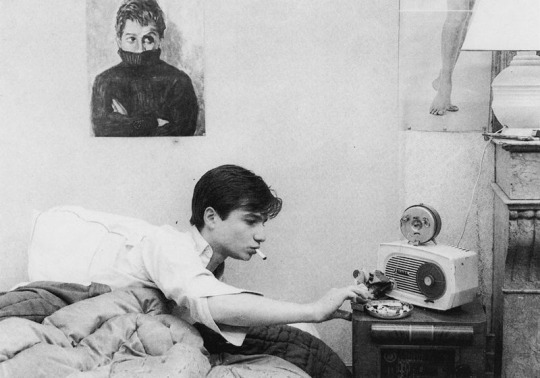
Jean-Pierre Léaud in “Antoine e Colette” directed by François Truffaut, 1962.
5 notes
·
View notes
Text
Tagged by @ragebred ty ! ♥ ♥ ♥
Tagging @burden-and-truth @scneschal and anyone who wants to steal it ♥
b a s i c s
▍ face claim: Nikita Andrianova.
▍ name: Fiora Colette Antoine Marie Laurent.
▍ age: 27.
▍ gender: Female.
▍ nationality: Demacian.
▍ residence: Demacia City.
▍ marital status: Single. Always single. :)
l i k e s
▍ drink: Demacian sparkling wine.
▍ food: Seafood! Mostly oysters.
▍ day or night: Day.
▍ snacks: Dried fruits.
▍ songs: Calm ballads.
▍ quote: " Sharp blade, sharp mind. "
▍ historical character: Demacia’s first Woman soldier.
▍ pet: None.
▍ book: History books.
▍ color: Rouge Pink.
▍ flower: Red Roses.
▍ sexuality: Pansexual.
▍ romantic orientation: Demisexual.
l o o k s
▍ body type: Well toned, Meso-Ectomorph.
▍ eye color: Bright Blue.
▍ hair color: Jet Black with a white streak.
2 notes
·
View notes
Photo

O AMOR EM FUGA | ★ ★ ★ ½
#144 | François Truffaut, 1979
.
"Antoine Doinel agora tem mais de trinta anos. Ele se divorciou de Christine. Trabalha como revisor em um jornal e está apaixonado por Sabine, uma vendedora de discos. Colette, seu amor adolescente, agora é uma advogada. Ela compra o primeiro romance autobiográfico publicado de Antoine. Eles acabam se reencontrando em uma estação de trem."
.
Visto na TV por Telecine Play em 30 de abril. // Seen on TV by Telecine Play on Apr 30, 2020.
#cartaz#poster#tv#l'amour en fuite#françois truffaut#o amor em fuga#telecine play#digital#abril#2020#R$0#custo zero#quinta-feira#inédito
0 notes
Text
François Bernouard sits next to the radio producer and composer Ernst Schoen. Here is something Bernouard did on the radio: a dialogue between him and Jean Le Louët on the group LES AMIS de 1914 and Théâtre Impossible, broadcast on Wednesday 1st of August 1934 for P.T.T.

On the transcript LES AMIS de 1914 are listed as a vast new diagram as: Paul Fort. André Salmon. André Lebey. André Varnod. Mr. Richard. Jacques Dyssord. Sometimes Bernouard. Deville. C. Fegdal. G. Duhamel. Valensi. Ernest Gaubert. Antoine Orliac, X. de Magallon. P. Corpus, JL Vaudoyer. Luc Durtain. Pierre de Guingand. AF Hérold. Th. Briant, Ch. Du Bos. F. Carco. Dr. Mardrus J. Royère. P. Bertin. A. Germain. Dr. EF Julia. René Lalou. Louis Suë. A. Lhote. D. Halévy. Mrs. and Dr. Béliard. Gabriel Boissy. J. Villon. A. Bonnard. Ed. Jaloux. André David. René Fauchois. H. Strentz. Jehan Bouvelet. René Bertrand. Asselin. Max Jacob. Jean Giraudoux. Dr. Vinchon. Emile. Fabre. Master Dernis. Arnould Galopin. Léandre Vaillat. Ch. Chassé. Mr. Rouff. Jean de Pierrefeu. Dorgelès. Pol-Neveux. Paul Leon. Mr. Bedel. Tristan Bernard. R. Groos. Van Melle. F. Lot. Maurice Ravel. E. Marsan. P. Brulat. J. Daragnès. Etienne Rey. Faure-Biguet. E. Champion. Mr. Chadourne. Florian-Parnnentier. Carlo Rim. F. Fosca. F. Crommelynck. Fernand Divoire. Krettly. Michel de Gramont. Louis Mandin. Paul Chack. Mario Meunier. Dear. Megglé. J. and J. Tharaud. Alphonse Séché. Valmy-Baysse. Louis Gillet. R. Chambe. Léon Vérane. Carlègle. Gerarl Bauër. Lemercier. Robert Bonfils. L. de Gonzague-Frick. Pierre; The guard. Fagus. Guy Lavaud. Othon Friesz. E. Montfort. R. Gillouin. Tzanck. André Arnyvelde. Gonon. Ed. Dujardin. Valéry Larbaud. A. Rivaud. Jean Prévost. R. Kerdyk. Fernand Fleuret. G. Fréjaville. H. Falck. J. Mortane. Lugné-Poë. R. Le Masle. Mr. Chevrier. Lantern. G. Kahn. G. de Lautrec. LP Fargue. Legrand-Chabrier. JE Blanche. F. Gregh. Paul Poiret. Martial Piéchaud. Gino Severini. J. Cocteau. A. Fontainas. Lucien Fabre. G. Le Rouge. Henri Duvernois. André Maurois. GL Garnier. Ramey. André Billy. Roger Dévigne. Guy Mazeline. J. Barois. Henri Massis. Léon Bailby. E. Bourcier. Georges Denis. Denis d'Inès. Jean Hervé. CR Martin. Ph. Besnard. of Chauveron. Latapia. Rosny elder. Curnonski. P. Descaves. Levesque. J. Joyce. Marcel Jouhandeau. Albert Bayet. V Brechignac. Jean Marchand. F. Casadesus. R. Fellowes. Rachilde. Mr. Laurencin. Colette. J. Sully. M. Harkavy, Y. Gall. Hermine David. Suzanne Valadon. Eve Francis. Colonna-Romano. A. and S. Bernouard. L. Noblet. Yvette Guilbert. Suzanne Desprès. Alice Dufrène. Marcelle Brou. Aldona. Chériane .: G. Rabette. Berthe Bovy. Jane Bathori. Jeanne Landre. Annie Ducaux. Gisèle Casadesus. Vera Korene. Titayna. Dussane. R. Berendt. Garcia. Jean Hervé. CR Martin. Ph. Besnard. of Chauveron. Latapia. Rosny elder. Curnonski. P. Descaves. Levesque. J. Joyce. Marcel Jouhandeau. Albert Bayet. V Brechignac. Jean Marchand. F. Casadesus. R. Fellowes. Rachilde. Mr. Laurencin. Colette. J. Sully. M. Harkavy, Y. Gall. Hermine David. Suzanne Valadon. Eve Francis. Colonna-Romano. A. and S. Bernouard. L. Noblet. Yvette Guilbert. Suzanne Desprès. Alice Dufrène. Marcelle Brou. Aldona. Chériane .: G. Rabette. Berthe Bovy. Jane Bathori. Jeanne Landre. Annie Ducaux. Gisèle Casadesus. Vera Korene. Titayna. Dussane. R. Berendt. Garcia. Jean Hervé. CR Martin. Ph. Besnard. of Chauveron. Latapia. Rosny elder. Curnonski. P. Descaves. Levesque. J. Joyce. Marcel Jouhandeau. Albert Bayet. V Brechignac. Jean Marchand. F. Casadesus. R. Fellowes. Rachilde. Mr. Laurencin. Colette. J. Sully. M. Harkavy, Y. Gall. Hermine David. Suzanne Valadon. Eve Francis. Colonna-Romano. A. and S. Bernouard. L. Noblet. Yvette Guilbert. Suzanne Desprès. Alice Dufrène. Marcelle Brou. Aldona. Chériane .: G. Rabette. Berthe Bovy. Jane Bathori. Jeanne Landre. Annie Ducaux. Gisèle Casadesus. Vera Korene. Titayna. Dussane. R. Berendt. Garcia. Hermine David. Suzanne Valadon. Eve Francis. Colonna-Romano. A. and S. Bernouard. L. Noblet. Yvette Guilbert. Suzanne Desprès. Alice Dufrène. Marcelle Brou. Aldona. Chériane .: G. Rabette. Berthe Bovy. Jane Bathori. Jeanne Landre. Annie Ducaux. Gisèle Casadesus. Vera Korene. Titayna. Dussane. R. Berendt. Garcia. Hermine David. Suzanne Valadon. Eve Francis. Colonna-Romano. A. and S. Bernouard. L. Noblet. Yvette Guilbert. Suzanne Desprès. Alice Dufrène. Marcelle Brou. Aldona. Chériane .: G. Rabette. Berthe Bovy. Jane Bathori. Jeanne Landre. Annie Ducaux. Gisèle Casadesus. Vera Korene. Titayna. Dussane. R. Berendt. Garcia. The address is given: 224 Boulevard Raspail
In the dialogue François Bernouard says that the LES AMIS de 1914 were born of out of necessity, for writers but also architects, painters, sculptors, musicians to defend lyricism in the aftermath of war: “The war and its multiple consequences had separated us. Each one like you, worked isolated, we knew each other only by our writings and certain old comrades had not seen each other for twenty years. Here are some reasons for the continued success of our evenings”
The first meeting took place on 17 February 1933. “The invitation was issued on behalf of Paul Fort, Prince des Poëtes, André Salmon, Jacques Dyssord, André Warnod, André Lebey, and me. It was a wonderful evening, despite the freezing cold; more than 600 artists and art lovers came, the elite of Paris”. On night Paul Fort declared: “Retrouvons-nous chaque vendredi et soyons les inséparables de 1914, nos cadets seront reçus comme nos enfants”
For those who survived the war, LES AMIS de 1914 was to be a place to meet to discuss art with the peaceful spirit (l'esprit pacifique) of the days which preceded the catastrophe of 1914
But they were too sensitive to those no longer present: “Our friendship should remember the dead, either before, during or after the war, and try to redress a little the injustice of fate towards those who will remain in the eternal time of the young. I cannot cite them all. These were the memories of Guillaume Apollinaire, Henri Bouvelet, Emile Despax, the Englishman Rupert Brooke, Fagus, Jehan Rictus, Charles Derennes, Joachim Gasquet, Paul Drouot, Alfred Jarry, Jean Jareas, Jean Moreas, Paul Napoleon Roinard, René Dalize, Raymond Radiguet, Jean Le Roy, Stuart Merrill, Charles de Fontenay, Jean de la Ville de Mirmont, Sanche de Gramont, Robert d'Humières, Amédée Prouvost, John-Antoine Nau, Odilon-Jean Périer, Auguste Angellier, Adrien Bertrand, André Dupont, Albert Samain, Gabriel-Tristan Franconi, Ricciotto Canudo who, born Italian, chooses the French language to express himself, all writers of first quality. The present is often unfair to them, but posterity will do them justice”
Questions of generation also come up; alongside the slippage of the category of ‘friendship’ into something militaristic (just as from German “comrade” can slip from Genossen to Kamerad and Freund/in can denote both a platonic and a non-platonic relationship)
0 notes
Photo

342. Antoine e Colette (Antoine et Colette, 1962), dir. François Truffaut
1 note
·
View note
Photo
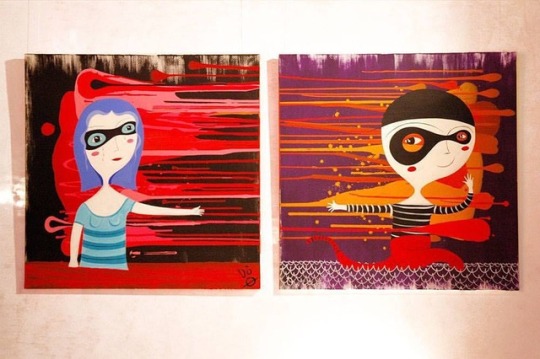
ANTOINE e COLETTE ...due lavori su tela che ho fatto alcuni anni fa. Antoine e Colette si cercavano a vicenda per le strade e i vicoli di Brescia. L'una chiedeva ai passanti se avevano visto l'altro e viceversa...qualcuno rispondeva vagamente...altri in modo più certo. Non erano mai nello stesso momento nello stesso luogo; solo in questi due quadri quasi quasi si sfiorano. Do the Clef Acrilico su tela 1m X 1m (presso Contrada Delle Cossere 14)
1 note
·
View note
Note
2. 8, 10, 13, 30, 42 for Antoine ;)
For you: B, D, E, F
Hi TK!! WELCOME WELCOME TO MY INBOX, MY DEAR FRIEND!!
AND YOU BRING QUESTIONS FOR MY DEAR ANTOINE???
*rubs hands together* SPLENDID. I AM MOST HAPPY ABOUT THIS.
Without further ado, lemme answer all that you have asked!!
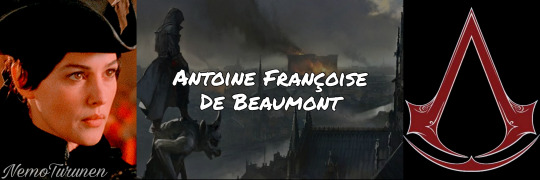
2-How easy is it for your character to laugh?
Laughter?? Antoine?? Dear Gods, Laughter is to Antoine what the Sun is to a Vampire! She grew up directly under her father’s strict tutelage, and laughter or any kind of sign of spontaneity were definitely not encouraged at all. So, she never laughed much as a child, and growing up, due to all that has happened in her life, she still doesn’t laugh much, if at all. She wishes she could, though. She is so aware of how serious she is, how strict she is toward herself, how in control of her emotions she always is, but she doesn’t enjoy being the way she is, and even if she doesn’t show it, she is always wounded whenever someone calls her a killjoy. She wants to be happy and laugh, but she doesn’t know how anymore.
8-What were they told to stop/start doing most often as a child?
As a child, Antoine was partially subjected to a most peculiar education: her father wanted her to be the son he knew Mathias would never be, and her mother instead wanted her to grow up to be as a refined lady as she herself was, and this caused her a huge conflict within herself. Her natural instinct and her natural strong personality made her feel more attuned with what her father wanted her to be, but her mother still insisted that she was to be poised and graceful. So, as a child, she was always told to act like a lady, to be elegant, sophisticated, polite, and becoming, and she hated it because she could never be enough, could never live up to what they expected of her. She was not a boy, so she could not live up to be the son her father wanted, and she was not feminine enough to fulfill her mother’s wishes to become the next Mistress of the House, and this brought her to reject all that’s feminine and delicate and graceful. Her rocky relationship with Dorothea, at least in the beginning, stems also from all of this.
10-What lie do they most frequently remember telling? Does it haunt them?
The biggest lies Antoine has ever said are connected to the darkest secret she carries in her heart. No one knows about this and no one ever will. She has sworn to herself that she would carry this secret to her grave because she knows what would happen to Mathias and Colette, and Claude, if she were to reveal it, and she is terrified of losing them. On a lighter tone, the lie she most frequently remember telling is connected to her name. Her birth name was Antoinette and her twin usually refers to her as "Toinette" but DEAR GODS ABOVE, DO NOT DARE TO CALL HER WITH THAT NAME. She goes by Antoine for a reason, and she will VERY MUCH glare if anyone dares to try to tell her that she is lying about her name.
13-What color do they think they look best in? Do they actually look best in that color?
Antoine thinks that the best colours for her is olive green, tawny, and cream, and she looks extremely handsome when wearing this palette. However, she was once convinced into wearing the darkest shade of black, white, and red, and she truly looked stunning in that palette. Still, she prefers to see herself in the modest shades of her Assassin’s garb.
30-Who do they most regret meeting?
François-Thomas Germain. Dear Gods, Germain is the one she regrets the most meeting. To him and his persona are connected all her shame and her secrets, all that she has kept from her family in order to protect them and provide for them when Mathias was injured and Colette was too young to do anything to help. Sometimes, when she allows herself to feel fragile -and it happens very rarely - she wished she had done things differently and she wished she had had someone that could have guided her through the most difficult moments of her life. Sometimes she wonders what person she would have been, had she not met Germain, for she truly believes part of the reason her heart has become so hard is due to her connection to him.
42-How badly do they want to reach their end goal?
It depends on the goal. Antoine has no interest in pursuing any personal gain or glory, at least not to the same extent like when she was younger and still very much influenced by her father’s indoctrination and teachings. But she does believe that the Brotherhood tenets and the creed should be respected and followed and she believes that there cannot be compromises with the Templars, on any level. She applies the same passionate intransigence, even in respect of her siblings safety and well-being. So, to protect the Brotherhood, her brothers-in-arms and her blood siblings, she is truly willing to go above and beyond. She is ready to face the consequences that will come with her choices, if it means to ensure the safety of the people around her.
QUESTIONS FOR THE CREATOR A.K.A ME
B-What inspired you to create them?
I can definitely say that Antoine was born as the “reworked” version of her sister Colette. You see, when I created Colette, back in 2020, she was an only child, much like Dorothea is in Syndicate. However, over time, I wanted to give her a more ample entourage of OCs to interact with, and I wanted them to belong to the Brotherhood(Colette herself is a civilian. Sympathizer, sure, but still civilian and inactive in the Assassins/Templars War). So, first I decided to make Mathias (aka my own version of Greencoat) her elder brother. But then I wasn’t satisfied. I felt I might need to retooled Colette’s character, so I went to the draftboard and started reworking on her whole personality and motivation, and it was in that moment that Antoine was actually born, albeit, at that moment, it was still under the name of Colette. Then, I was kinda missing the spontaneous, sweet, veracious personality my Colette had in the beginning, but I had also grown attached to my emotionally constipated new brainchild. And so, I decided to keep what I came up with and Antoine was born, the eldest of the De Beaumont children, tough as nails but with a soft heart for her siblings.
D-Have they always had the same physical appearance, or have you had to edit how they look?
Her physical appearance was pretty clear in my brain from the moment I took the decision to keep the character I had come up with. I wanted her to have a tough look, a sort of dangerous beauty, someone that you DON’T WANT to have at your tail, because once she has tracked you, she won’t let you go until she has completed her mission. Also, I wanted her to bear resemblance to her twin Mathias and her younger sister Colette. So, in that sense, I only edit her colouring, verging on a palette that would make it clear that she was Mathias’ twin and that she was connected also to his role as Greencoat, so to speak, AND with her hair and eyes instead verging more towards Colette’s own palette.
E-Are they someone you would get along with? Would they get along with you?
I would say yes and no to both question. Antoine is hard, stubborn, ruthless in her own right and ready to truly do anything for the people she loves. But she is too adamant, too harsh, and too difficult to reason with sometimes, so I think that we would butt heads ALL THE TIME (we both also have quite the fiery temper, so mmmm I think we would truly argue a lot, in virtue of the fact that we might be A TAD too similar in the way we reacts). But in general, she is motivated by the immense terror of losing the people she loves the most, she fears that some ill could befall them if she is not around to protect them, and I can relate to that to an extent, which is why I think this would be a point where the two of us would definitely see eye to eye.
F-What do you feel when you think of your OC (pride, excitement, frustration, etc)?
Pride. Oh so very much pride. She is one of my most favourite ocs out there, I truly respect her strength of mind, her cold blood and how she is able to lead people, and how much of a warrior she is. I just overall adore her (and I honestly live for the fact that she is super protective of both her siblings AND WILL MESS with the people that are in love with them -aka Arno and Dorothea. She has no problems letting them both have the shovel talk and tells them both that she WILL BE watching them, and if they dare to hurt either Mathias or Colette, they better pray to God to have mercy because she will have none lol).
------------------------------------------------------------------------------------------
thank you SO MUCH for these questions, I truly had so much fun, I don't talk enough about my dear Antoine, and she is my emotionally constipated gremlin that deserves all the hugs and the cuddles (she will act as if she doesn't want them, but trust me, SHE DOES AND SHE NEEDS THEM).
--Nemo
7 notes
·
View notes
Text
Desafio a biblioteca de Marilyn Monroe: você leu no máximo cinco desses 100 livros

Considerada uma das mulheres mais atraentes do século 20, Marilyn Monroe não é uma figura geralmente associada à literatura. Mas, o que poucos sabem é que a atriz era uma leitora ávida, que adorava livros clássicos e tinha uma biblioteca cheia de grandes obras. Além disso, anos após sua morte, vários textos de sua autoria foram encontrados, revelando que a Marilyn também era uma talentosa escritora. Por meio de fotos, entrevistas e depoimentos de amigos de Marilyn, o site Everlasting Star descobriu quais eram os livros e autores preferidos dela. Com base nessa lista, a Revista Bula reuniu cem obras da biblioteca de Marilyn Monroe e que foram traduzidas para o português. São grandes clássicos, entre eles: “O Vermelho e o Negro”, de Stendhal; “O Homem Invisível”, de Ralph Ellison; e “Madame Bovary”, de Gustave Flaubert. Após a análise das obras, os editores da Bula sugeriram que pouquíssimas pessoas já leram mais de cinco livros presentes na lista. Para participar do desafio, basta contabilizar e nos contar quantos destes você já leu.
1 — A Arte de Amar, de Erich Fromm
2 — A Balada do Café Triste, de Carson McCullers
3 — A Bondade Nada Tem a Ver com Isso, de Mae West
4 — A Dama das Camélias, de Alexandre Dumas
5 — A Filosofia de Schopenhauer, de Irwin Edman
6 — A Filosofia de Spinoza, de Joseph Ratner
7 — A Gaivota, de Anton Tchekhov
8 — A Inocência e o Pecado, de Graham Greene
9 — A Lei, de Roger Vailland
10 — A Queda, de Albert Camus
11 — A Sétima Cruz, de Anna Seghers
12 — A Última Tentação de Cristo, de Níkos Kazantzákis
13 — Adeus às Armas, de Ernest Hemingway
14 — Advogado do Diabo, de Morris L. West
15 — Alegria de Cozinhar, de Irma S. Rombauer e Marion Rombauer
16 — As Aventuras de Huckleberry Finn, de Mark Twain
17 — Balthazar, de Lawrence Durrell
18 — Boêmios Errantes, de John Steinbeck
19 — Cartas a um Jovem Poeta, de Rainer Maria Rilke
20 — Correspondente de Guerra, de John Steinbeck
21 — Crime e Castigo, de Fiódor Dostoiévski
22 — Da Rússia, Com Amor, de Ian Fleming
23 — Deitada na Escuridão, de William Styron
24 — Diário de um Homem Supérfluo, de Ivan Turguêniev
25 — Dublinenses, de James Joyce
26 — E as Chuvas Chegaram, de Louis Bromfield
27 — Em Busca do Tempo Perdido, de Marcel Proust
28 — Em Roma na Primavera, de Tennessee Williams
29 — Ensaios, de Thomas Mann
30 — Esta Terra é Minha, de Woody Guthrie
31 — Filhos e Amantes, de D.H. Lawrence
32 — Gargântua e Pantagruel, de François Rabelais
33 — Gente Independente, de Halldor Laxness
34 — Havaí, de James A. Michener
35 — Heróis de Barro, de Glendon Swarthout
36 — Irmã Carrie, de Theodore Dreiser
37 — Jesus, de Khalil Gibran
38 — Justine, de Lawrence Durrell
39 — Londres, de Jacques Boussard
40 — Longa Jornada Noite Adentro, de Eugene O’Neill
41 — Lugares Etruscos, de D.H. Lawrence
42 — Madame Bovary, de Gustave Flaubert
43 — Malcolm, de James Purdy
44 — Medea, de Jeffers Robinson
45 — Memórias de um Caçador, de Ivan Turguêniev
46 — Metafísica, de Aristóteles
47 — Minha Antônia, de Willa Cather
48 — Mitologia, de Edith Hamilton
49 — Moisés e o Monoteísmo, de Sigmund Freud
50 — Morte em Veneza, de Thomas Mann
51 — Mulher Pobre, de Leon Bloy
52 — Nana, de Emile Zola
53 — Napoleão, de Emil Ludwig
54 — Noite, de Francis Pollini
55 — Novelas Curtas, de Colette
56 — O Agente Secreto, de Joseph Conrad
57 — O Amante da Guerra, de John Hersey
58 — O Assistente, de Bernard Malamud
59 — O Barril Mágico, de Bernard Malamud
60 — O Fio da Navalha, de W. Somerset Maugham
61 — O Galpão do Jardim, de Graham Greene
62 — O Grande Gatsby, de F. Scott Fitzgerald
63 — O Guia, de R. K. Narayan
64 — O Homem Invisível, de Ralph Ellison
65 — O Homem Revoltado, de Albert Camus
66 — O Menino Perdido, de Thomas Wolfe
67 — O Pequeno Príncipe, de Antoine de Saint-Exupéry
68 — O Profeta, de Khalil Gibran
69 — O Sol Também se Levanta, de Ernest Hemingway
70 — O Som e a Fúria, de William Faulkner
71 — O Trem e a Cidade, de Thomas Wolfe
72 — O Vermelho e o Negro, de Stendhal
73 — Obras Selecionadas, de Alexander Pope
74 — On The Road, de Jack Kerouac
75 — Paris Vive à Noite, de Harold Flender
76 — Pensamento Político e Últimas Conclusões, de Albert Einstein
77 — Poemas e Contos de Fadas, de Oscar Wilde
78 — Poemas Selecionados, de D. H. Lawrence
79 — Poemas Selecionados, de Emily Dickinson
80 — Poemas Selecionados, de Rainer Maria Rilke
81 — Poemas Selecionados, de W. B. Yeats
82 — Que o Fogo Consuma Esta Casa, de William Styron
83 — Recordações da Casa dos Mortos, de Fiódor Dostoiévski
84 — Renoir, de Albert Skira
85 — Retrato do Artista Quando Jovem Cão, de Dylan Thomas
86 — Servidão Humana, de W. Somerset Maugham
87 — Smoke, de Ivan Turguêniev
88 — Sobre a Natureza das Coisas, de Lucrécio
89 — Sonetos, de William Shakespeare
90 — Spartacus, de Howard Fast
91 — Suave é a Noite, de F. Scott Fitzgerald
92 — Ulysses, de James Joyce
93 — Um Bonde Chamado Desejo, de Tennessee Williams
94 — Um Ciclone na Jamaica, de Richard Hughes
95 — Um Poeta em Nova York, de Federico García Lorca
96 — Uma Tragédia Americana, de Theodore Dreiser
97 — Verdes Moradas, de Green Mansions
98 — Wake Up, Stupid, de Mark Harris
99 — Winesburg, Ohio, de Sherwood Anderson
100 — Wordsworth, de Richard Wilbur
Desafio a biblioteca de Marilyn Monroe: você leu no máximo cinco desses 100 livros publicado primeiro em https://www.revistabula.com
0 notes